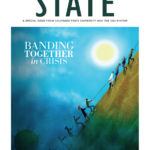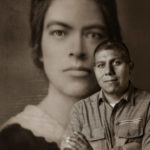Raven Pinto grew up in the Navajo Nation and hopes to establish a career working in Tribal policy. Photo: Mary Neiberg
I had the biggest backyard growing up on the Navajo reservation in Twin Lakes, New Mexico, north of Gallup.
I chased lizards, my desert relatives. I bounded in mud puddles and measured myself against wild sunflowers. Scenes of slow mornings and corn pollen, warm kitchens and náneeskaadí, or Navajo flatbread, were as familiar as my own name. The land, tribal stories, and close community are a gift that has defined my life.
Yet even with its profound beauty, the Navajo Nation carries brokenness: Our people have a long history of trauma, displacement, and marginalization. The COVID-19 pandemic has intensified dire health and economic disparities, has severed ties, and has deepened a sense of displacement that began with colonization.
Even before the pandemic, my people faced poverty and a paucity of resources to respond to major public health challenges. Census data show that one-third of homes in the Navajo Nation lack adequate plumbing, electricity, and clean running water. Poverty and housing shortages result in residential overcrowding; more than a dozen people might live in a two-room home. The Navajo Nation is one of the largest Native reservations in the United States, stretching across much of the Four Corners region in Arizona, New Mexico, and Utah; but it is served by only 13 grocery stores. Many families travel hours for food, clean water, and household supplies. Adding to these issues, widespread uranium contamination – the result of decades of uranium mining on the reservation – poses grave health risks for the Navajo community. The sunflowers I loved as a girl were even tested for their potential to soak up pollutants from soil and water.
I think about these long-standing conditions with a surge of emotion as I consider the burden of the pandemic for my people. The Navajo Nation has had one of the highest rates of COVID-19 infection of any region. Existing issues, such as inadequate water supply and crowded living conditions, are exacerbating the risk of contracting COVID-19 because many families do not have water for handwashing or space needed to self-isolate at home.
As I returned to Twin Lakes after graduation in May, a public health emergency had been declared on the Navajo Nation and has been extended multiple times because of alarming case counts and drastic impacts on hospitals and health care systems. At the start of July, my community remained under nighttime curfew orders and weekend lockdowns. Travel has been tightly restricted, making it even more difficult to obtain groceries and fulfill other basic needs. In addition, our health facilities have had inequitable access to the federal stockpile of medical supplies.
As a recent CSU graduate, I hope to establish a career in Tribal public policy that focuses on building better home and chapter communities. My love for our land and traditions has cultivated a desire to create sustainable, culturally relevant infrastructure and to provide greater opportunities for Native youth as a way to restore justice within the Navajo Nation. But it has sometimes felt like there are too many cups to pour into – issues so deeply rooted and complex that I question my capacity to fix them, especially since the pandemic began.
I have realized how crucial it is to press for solutions with the strength of many, including allies and more outspoken young people. The rest of the country must see my community and me not as spectacles of misfortune, but as an entire Nation in need of radical – and long overdue – reconciliation and healing.
Although my family members have not contracted the virus, I worry for elders in our community, especially my grandparents, who are 84 and 90 years old. They carry my family’s history and language on their tongues. As a young Navajo woman, I see that COVID-19 is more than a disproportionate threat to the lives of my elders; it is a threat to the traditions, stories, and wisdom they have shared – the beauty that has shaped my life.
Raven Pinto graduated from Colorado State University in May with a bachelor’s degree in political science. She was in the Honors Program, was named outstanding graduate in CSU’s College of Liberal Arts, and represented the Native American Cultural Center in student government. She interned for the office of U.S. Sen. Tom Udall of New Mexico.





